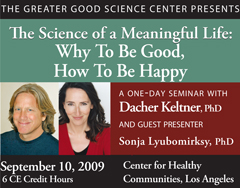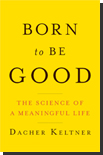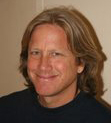


- August 28, 2009—Shrink Wrap Radio: Happiness and Health with Dacher Keltner
» Listen to the interview now - Fall 2006—Human Emotion Podcast: webcast.berkeley course
» Listen to the podcast now (free)
- October 10, 2009—Born to Be Good: the Science of a Meaningful Life, Marin County Psychological Association. Marin, CA
- October 23, 2009—Greed, Games & Goodness, Michael Lewis in Conversation with Dacher Keltner. Zellerbach Playhouse, Berkeley, CA
- November 4, 2009—Berkeley Library Panel: Darwin's Enduring Legacy. Wheeler Hall, Maude Fife Room 315, Berkeley, CA
- November 8, 2009—Does Darwin Illuminate Emotion & Spirituality? Wonderfest 2009, Berkeley, CA
- November 12, 2009—Quality of Life Series. Seattle, WA
- November 30, 2009—Born to be Good: The Science of a Meaningful Life. Saint Andrew's Episcopal School, STAR Speaker Series, Saratoga, CA
- December 3, 2009—Connecting Hearts and Minds: Time for Kids Keynote. Hyatt Regency San Francisco Airport, Burlingame, CA
- December 7, 2009—Parent Education. San Francisco, CA
- December 9, 2009—Google Speaker Series. Google Campus, Mountain View, CA
- January 31, 2010—Parent Education. Prospect Sierra School, Mountain View, CA
- February 26, 2010—Goodness, Evil, and Everyday Heroism with Phil Zimbardo. Berkeley, CA*
- April 9, 2010—Compassion & Positivity with Barbara Fredrickson. Berkeley, CA*
2009 Talks
- January 21, 2009—Berkeley Arts and Lectures. Berkeley, CA
- January 28, 2009—Kepler's Books. Palo Alto, CA
- January 29, 2009—Mechanics' Institute. San Francisco, CA
- February 1, 2009—92nd Y New York City. New York City, NY
- February 4, 2009—Los Angeles Public Library. Los Angeles, CA
- February 27, 2009—International House, UC Berkeley (with Paul Ekman)*
- March 17, 2009—Alumni House. UC Berkeley, Berkeley, CA
- March 19, 2009—Faculty Club. UC Berkeley, Berkeley, CA
- March 25, 2009—Cal Discover Lecture Series. Lafayette, CA
- April 17 & 19, 2009—California Psychological Association. Oakland, CA
- April 18, 2009—Cal Day. UC Berkeley, CA
- April 20, 2009—Keynote Address, UC Berkeley School Psychology Program Annual Conference
- April 25, 2009—Kaiser Health Care Executives. San Francisco, CA
- April 30, 2009—Cal Discover Lecture Series. La Jolla, CA
- May 15, 2009—International House, UC Berkeley (with Jon Kabat-Zinn)*
- May 23, 2009—American Psychological Science Annual Conference. San Francisco, CA
- September 10, 2009—Why to Be Good, How to Be Happy. Center for Healthy Communities, Los Angeles (with Sonja Lyubomirsky)*
- September 11, 2009—IBP Health Care. Palo Alto, CA
- September 16, 2009—Creating Joy in the Community. Grace Church, Berkeley, CA
- September 18, 2009—IBP Health Care. San Rafael, CA
- September 26, 2009—IBP Health Care. San Francisco, CA
* Sponsored by The Quality of Life Foundation
2008 Talks
- October 3, 2008—Berkeley: Happiness and Health, Institute for Brain Potential
- October 10, 2008—Concord: Happiness and Health, Institute for Brain Potential
- October 23, 2008—San Luis Obispo: Happiness and Health, Institute for Brain Potential
- October 24, 2008—Monterey: Happiness and Health, Institute for Brain Potential
- November 6, 2008—CIO Summit, Dallas Texas
- December 2, 2008—CIO Summit, San Francisco
- December 2, 2008—Shift in Action Teleseminar
Born to Be Good: The Science of A Meaningful Life
 For too long we have assumed that the latest stage in human evolution is homo economicus: that we are wired to be selfish and competitive at the core and to give priority to the bad in the world over the good. Given this view, several things readily follow. Altruism is an illusion. Aggression and adversarial relations are natural states. Happiness derives from the pursuit of self-interest. This view of human nature has led us astray. What the new, Darwin inspired science of positive emotion is showing is that we are wired to care, to laugh, to forgive, and to be modest. People derive greater happiness spending $20 on someone else than on themselves to indulge some desire. Pleasant touch reduces stress-related physiology and boosts the immune system, as well as individual and social well-being. A bundle of nerves in the chest unique to mammals — the vagus nerve — enables us to connect, to revere, to be inspired, and to appreciate others. New neuroscience suggests when we give to others, or act cooperatively, the nucleus accumbens, a region of the brain known to have many dopamine receptors and to process rewards, lights up. New discoveries are finding that oxytocin, a neuropeptide that floats through the bloodstream, promotes trust and devotion. Modest expressions of gratitude, the simple "thank you," smile, or warm gaze, prompts the recipient of such kindness to be kind in ensuing interactions. Even in economic games between strangers, cooperators and those who forgive their partner's more selfish behaviors fare better than competitors in terms of economic outcome. Survival of the kindest may be a more apt description of human nature rather than survival of the most selfish. Happiness may be closer than you think, and can be found in the cultivation of the emotions that evolution has shaped in this most caring and playful of species.
For too long we have assumed that the latest stage in human evolution is homo economicus: that we are wired to be selfish and competitive at the core and to give priority to the bad in the world over the good. Given this view, several things readily follow. Altruism is an illusion. Aggression and adversarial relations are natural states. Happiness derives from the pursuit of self-interest. This view of human nature has led us astray. What the new, Darwin inspired science of positive emotion is showing is that we are wired to care, to laugh, to forgive, and to be modest. People derive greater happiness spending $20 on someone else than on themselves to indulge some desire. Pleasant touch reduces stress-related physiology and boosts the immune system, as well as individual and social well-being. A bundle of nerves in the chest unique to mammals — the vagus nerve — enables us to connect, to revere, to be inspired, and to appreciate others. New neuroscience suggests when we give to others, or act cooperatively, the nucleus accumbens, a region of the brain known to have many dopamine receptors and to process rewards, lights up. New discoveries are finding that oxytocin, a neuropeptide that floats through the bloodstream, promotes trust and devotion. Modest expressions of gratitude, the simple "thank you," smile, or warm gaze, prompts the recipient of such kindness to be kind in ensuing interactions. Even in economic games between strangers, cooperators and those who forgive their partner's more selfish behaviors fare better than competitors in terms of economic outcome. Survival of the kindest may be a more apt description of human nature rather than survival of the most selfish. Happiness may be closer than you think, and can be found in the cultivation of the emotions that evolution has shaped in this most caring and playful of species.
The Power Paradox: Toward Socially Intelligent Leadership
We have been misled by Machiavellian notions of power, that power is based in deception, strategic manipulation, and leading through fear rather than respect and kindness. The new science of power reveals instead, that power is rooted in the ability for people to advance the interests of the greater good. It is given to others who bring people together and build strong social networks rather than grabbed by the power hungry. The experience of power, though, diminishes our capacities for social intelligence, making people more likely to act impulsively and suffer empathy failures in their exchanges with others. Given this paradox — that people acquire power through socially intelligent practices, but lose those talents once feeling the surges of power — there is a strong need for the cultivation of social intelligence. This is done in the micro-interactions that build up liking, trust, respect, strength, credibility, and openness.
Happiness and Health
The new science of happiness suggests that the ancient ways of knowing were onto something: that through the right cultivation of mindful practices, we can find greater happiness and promote the happiness of others (Jen in Confucianist thought). The need for cultivating these practices is greater than ever: numerous studies suggest that our marriages are less happy than they should be, our children (US) are some of the least happy in the industrialized world, our communities are less trusting, and we, as individuals, endowed with the right to pursue happiness, are not faring well in this endeavor. Happiness and health are found in practices that diminish the toxic effects of stress — social contact, laughter, nature, meditation, physical exertion. Happiness and health are found on a second pathway as well, the cultivation of the emotions that enable us to bring out the good in others — reverence, compassion, gratitude, awe, love, and modesty.







